
I vehemently reject Ozturk's politics, but am glad she cannot be deported. Trump's Stasi style attempts to silence her free speech, misinformed and hypocritical as it may be, are anti American. Ozturk did nothing wrong. Her intimidation is abhorrent.
10.02.2026 18:26 — 👍 1 🔁 0 💬 0 📌 0
Y Lab - YY Ahn
We’re recruiting PhD students at @uvadatascience.bsky.social, and I’m looking for students to join our group (Y Lab) next year!
My group works at the intersection of network science, machine learning, and interpretable AI.
yyahn.com/ylab/
Apply here! datascience.virginia.edu/degrees/phd
25.11.2025 19:59 — 👍 8 🔁 4 💬 0 📌 0
Faculty Positions in Organizational Behavior
Learn about tenured and non-tenured faculty positions open in the organizational behavior area at Stanford GSB.
The Stanford GSB is hiring in macro & micro OB! If you do sociology, psychology, OB, strategy, management, computational social science, please apply.
On the macro side, mid-career folks are especially invited to apply.
See here👇
www.gsb.stanford.edu/jobs/faculty...
24.07.2025 21:29 — 👍 15 🔁 17 💬 0 📌 2
Yes--Germany invented the modern university. In the 1930s its universities were the best in the world until the Nazis destroyed them. German universities have never recovered their preeminence. We risk repeating this history here in the US.
30.03.2025 14:42 — 👍 2363 🔁 702 💬 46 📌 28

Eva Illouz is a world class sociologist. She is a giant of cultural sociology, and I learned immensely from her work. That the corrupt and authoritarian Israeli government denied her this well-deserved prize is testament to her quality and intellectual integrity.
25.03.2025 04:33 — 👍 4 🔁 2 💬 0 📌 0
You might be underestimating how many Jewish academics are secretly cheering with schadenfreude.
Thank you for reading.
20.03.2025 14:30 — 👍 1 🔁 0 💬 0 📌 0
You can create an account and read it in full for free
19.03.2025 20:49 — 👍 0 🔁 0 💬 0 📌 0
@drbjrisman.bsky.social and I are both Jewish sociologists. We think that campus antisemitism is real, but refuse to be used as a cudgel by an authoritarian administration hellbent on retribution and destroying academia, indeed, America.
So we write about it:
www.chronicle.com/article/trum...
19.03.2025 20:48 — 👍 16 🔁 3 💬 1 📌 1
I enjoyed reading it, and learned a lot!
19.03.2025 20:46 — 👍 1 🔁 0 💬 1 📌 0
With Lara Yang, Sarayu Anshuman and Sameer Srivastava.
03.03.2025 17:47 — 👍 0 🔁 0 💬 0 📌 0
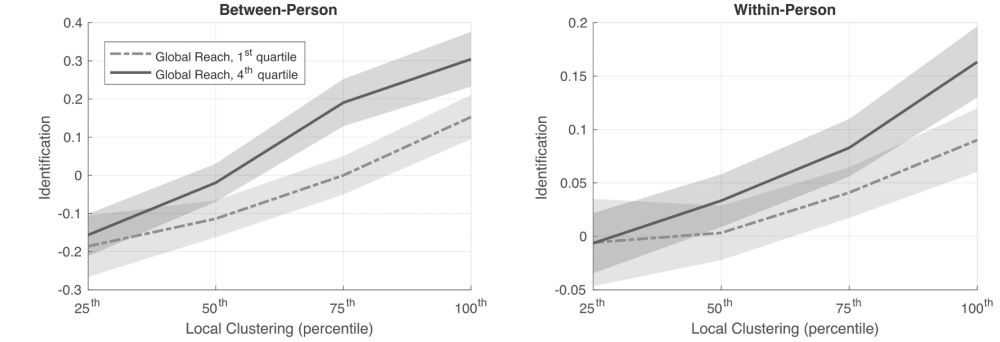
Do our findings extend beyond organizations? We speculate they do. The effects of global reach on identification are highest for those in very clustered networks. Identification with an "imagined community" requires a combination of local cohesion and global integration.
03.03.2025 17:47 — 👍 0 🔁 0 💬 1 📌 0
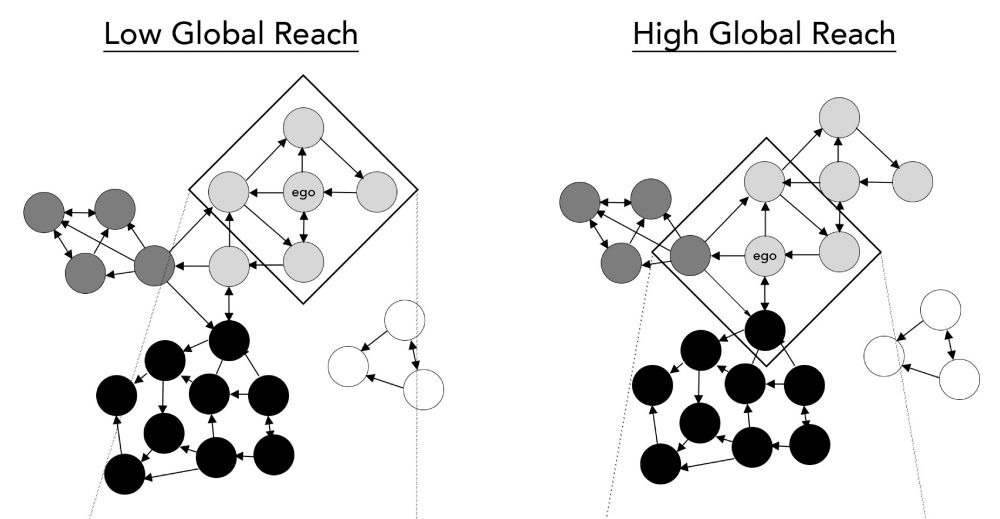
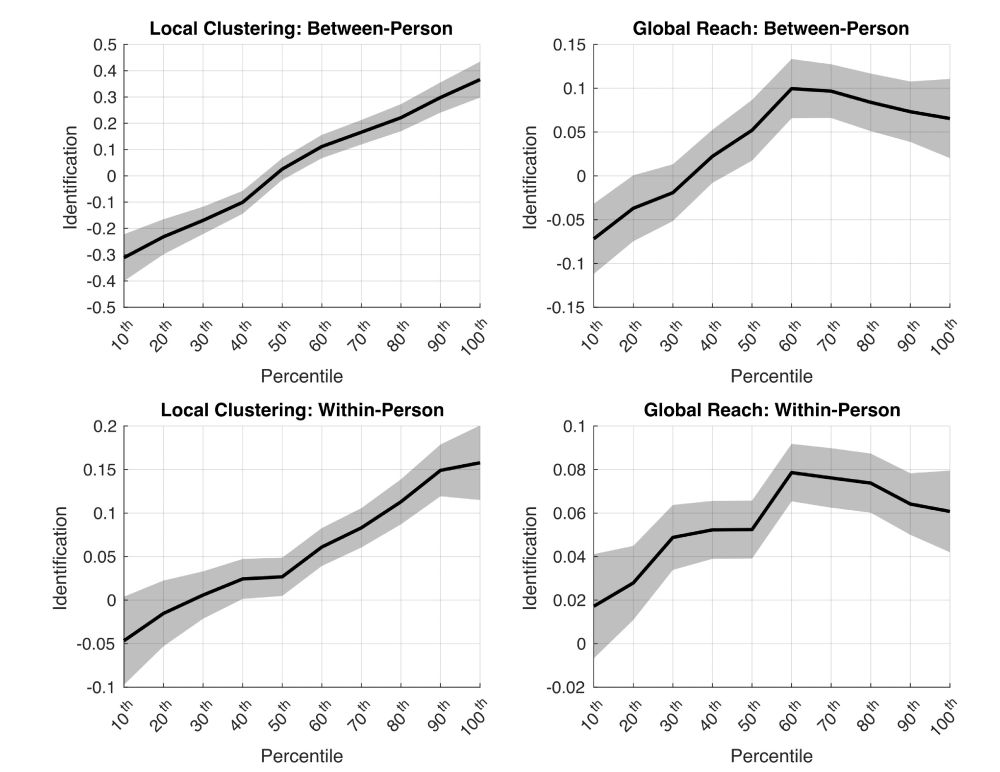
We look at two network measures (inferred from email exchange): local clustering (how tight knit one's ego network is) and a new measure, global reach (how distributed one's ego network is across multiple communities).
Both predict identification, even within person over time.
03.03.2025 17:47 — 👍 0 🔁 0 💬 1 📌 0
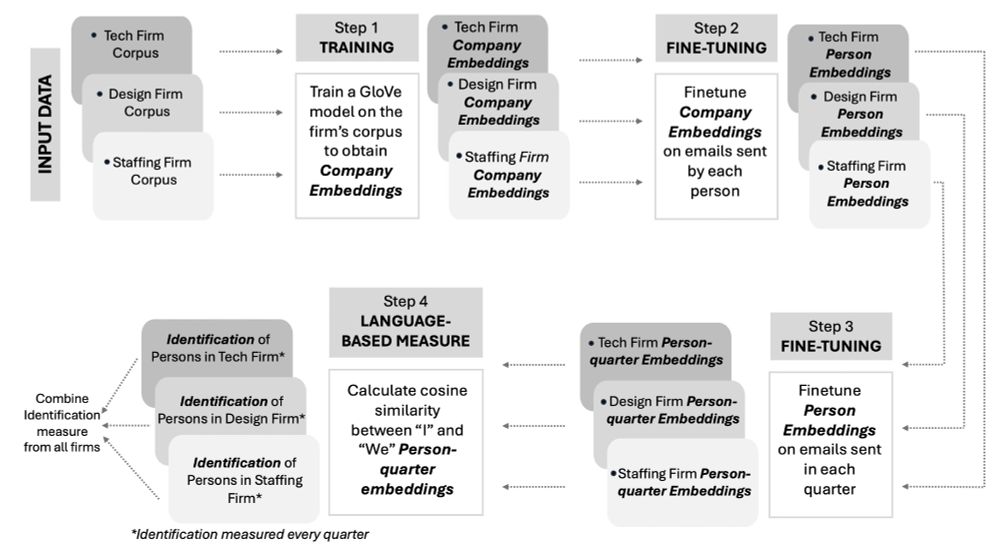
To measure identification, we use Mittens, an extension of GloVe, to fit person embeddings (from email) across 3 orgs. We measure the similarity between "I" and "we" as each person's identification strength at a given time unit.
github.com/roamanalytic...
03.03.2025 17:47 — 👍 0 🔁 0 💬 1 📌 0
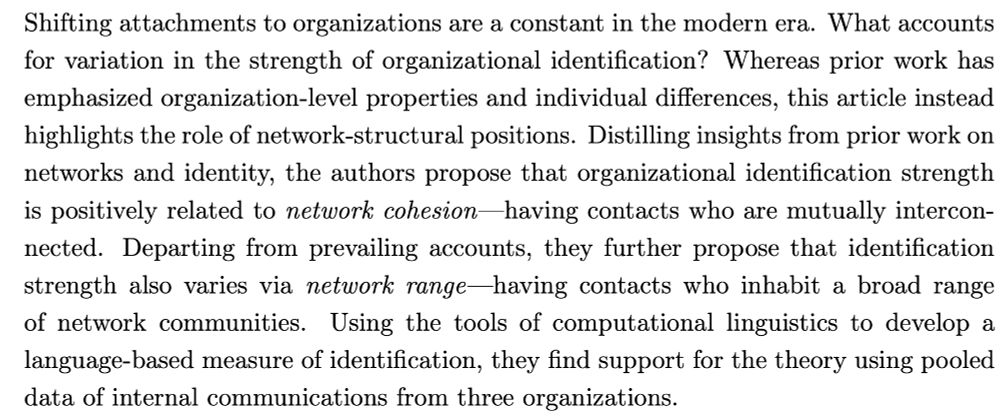
New paper from the computational culture lab, forthcoming @amjsoc.bsky.social!
Building on (largely untested) sociological intuitions, we show how positions in the organizational network relate to identification with the organization, using a language model:
www.journals.uchicago.edu/doi/abs/10.1...
03.03.2025 17:47 — 👍 19 🔁 7 💬 1 📌 0
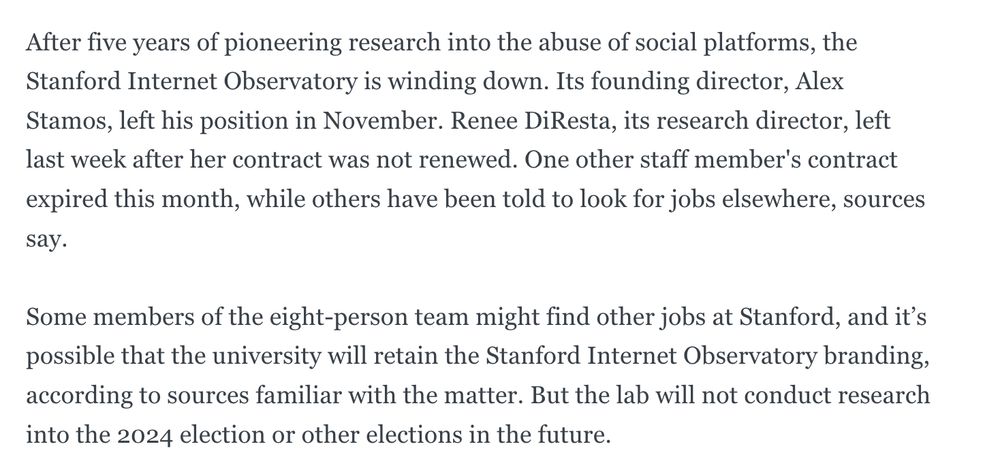
After five years of pioneering research into the abuse of social platforms, the Stanford Internet Observatory is winding down. Its founding director, Alex Stamos, left his position in November. Renee DiResta, its research director, left last week after her contract was not renewed. One other staff member's contract expired this month, while others have been told to look for jobs elsewhere, sources say.
Some members of the eight-person team might find other jobs at Stanford, and it’s possible that the university will retain the Stanford Internet Observatory branding, according to sources familiar with the matter. But the lab will not conduct research into the 2024 election or other elections in the future.
NEWS: After sustained attacks from House Republicans, the Stanford Internet Observatory is being dismantled. A huge blow to academic freedom and our ability to understand platforms and influence operations www.platformer.news/stanford-int...
13.06.2024 23:05 — 👍 959 🔁 533 💬 41 📌 100
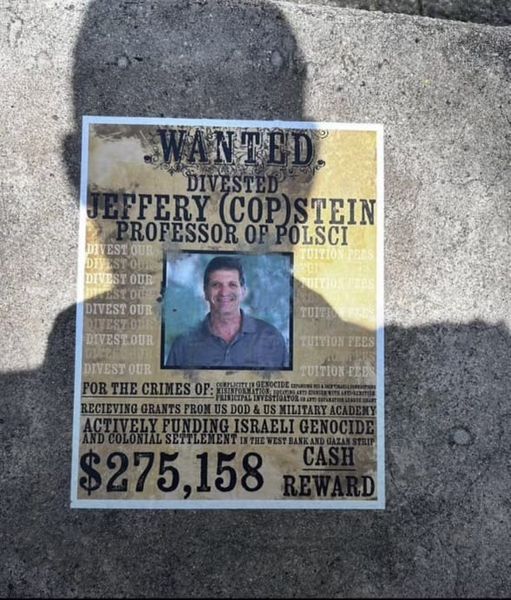
My friend @jeffkopstein.bsky.social , one of the most prominent researchers on contemporary antisemitism active today (and someone whose rigorous *empirical* work on the phenomenon is sorely needed), shared a photo of a "Wanted" poster targeting him on the UC-Irvine campus.
Despicable.
06.06.2024 23:08 — 👍 175 🔁 71 💬 8 📌 12
OSF
More fun applications in the article. You can find a pre-print here:
osf.io/preprints/so...
\end
29.05.2024 01:55 — 👍 0 🔁 0 💬 0 📌 0
What about schemas, you ask? Somewhat heretically (at least for cultural sociologists), we find this too expansive an analytical concept. We hope that thinking about categorization and semantic association, sociologists can be more precise when they talk about schemas. >>
29.05.2024 01:55 — 👍 0 🔁 0 💬 1 📌 0
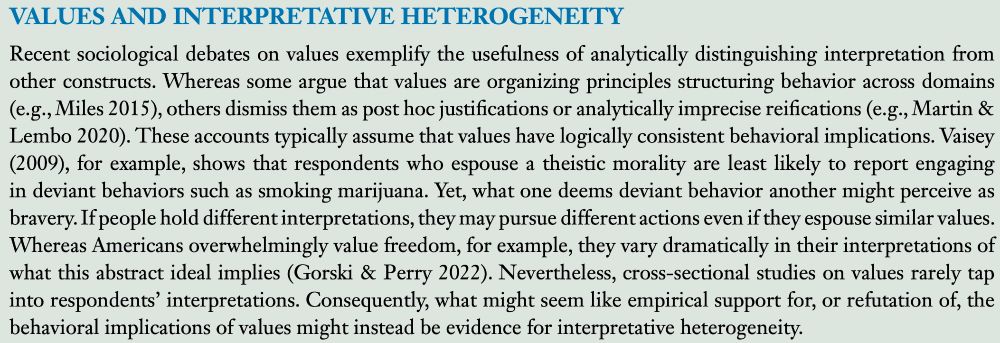
Thinking about interpretation, and especially interpretative heterogeneity, is important, because the links between people’s beliefs and their actions are often mediated by interpretation. You and I might both believe in diversity, but disagree on what this ideal means. >>
29.05.2024 01:54 — 👍 0 🔁 0 💬 1 📌 0

Framing, for example, affects recipients’ categorization and semantic association, both through verbal (by labeling and analogizing) and non-verbal (relationally and through co-occurrence) channels. >>
29.05.2024 01:54 — 👍 0 🔁 0 💬 1 📌 0
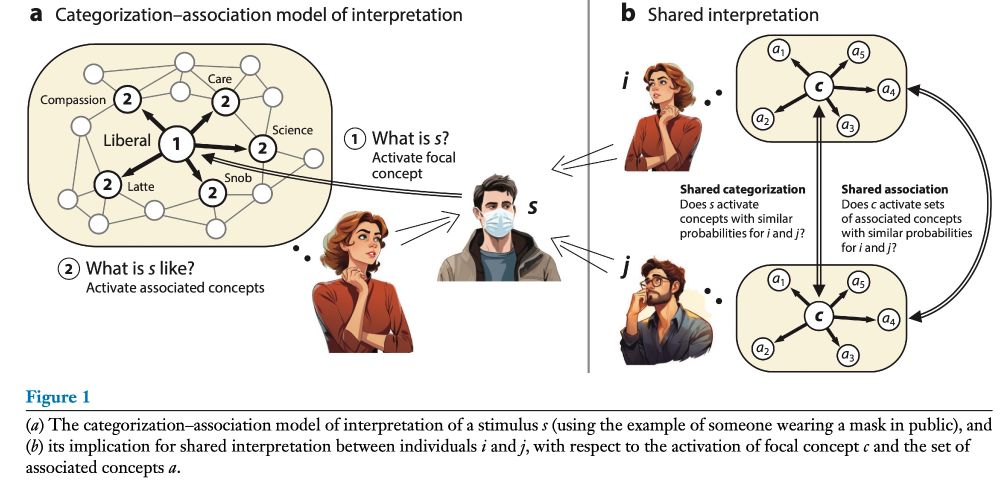
To interpret something is to associate it with a cognitive concept (categorization), invoking a set of associated concepts (semantic association). This enables us to conceptualize shared interpretation, and the process by which interpretations are coordinated across people. >>
29.05.2024 01:53 — 👍 0 🔁 0 💬 1 📌 0
The Sociology of Interpretation | Annual Reviews
Recent years have seen a growing sociological interest in meaning. In fact, some argue that sociology cannot confront its foundational questions without addressing meaning. Yet sociologists mean many ...
What do we mean when we study “meaning”? In a 🚨new ARS article🚨, Madison Singell and I suggest thinking of meaning as an actor interpreting something. Integrating sociological literature, we propose the Categorization-Association Model of Interpretation. >>
www.annualreviews.org/content/jour...
29.05.2024 01:52 — 👍 6 🔁 1 💬 1 📌 0
Excited to share that the Organizational Behavior area at the Stanford GSB is inviting applications for a postdoc in Macro OB for AY 2024/5.
Sociologists, organizational, management & strategy scholars, and computational social scientists, please apply!
👇
www.gsb.stanford.edu/jobs/postdoc...
03.02.2024 02:07 — 👍 5 🔁 4 💬 0 📌 0
Co-authored with the wonderful Abraham Oshotse and Yael Berda
16.11.2023 18:15 — 👍 0 🔁 0 💬 0 📌 0
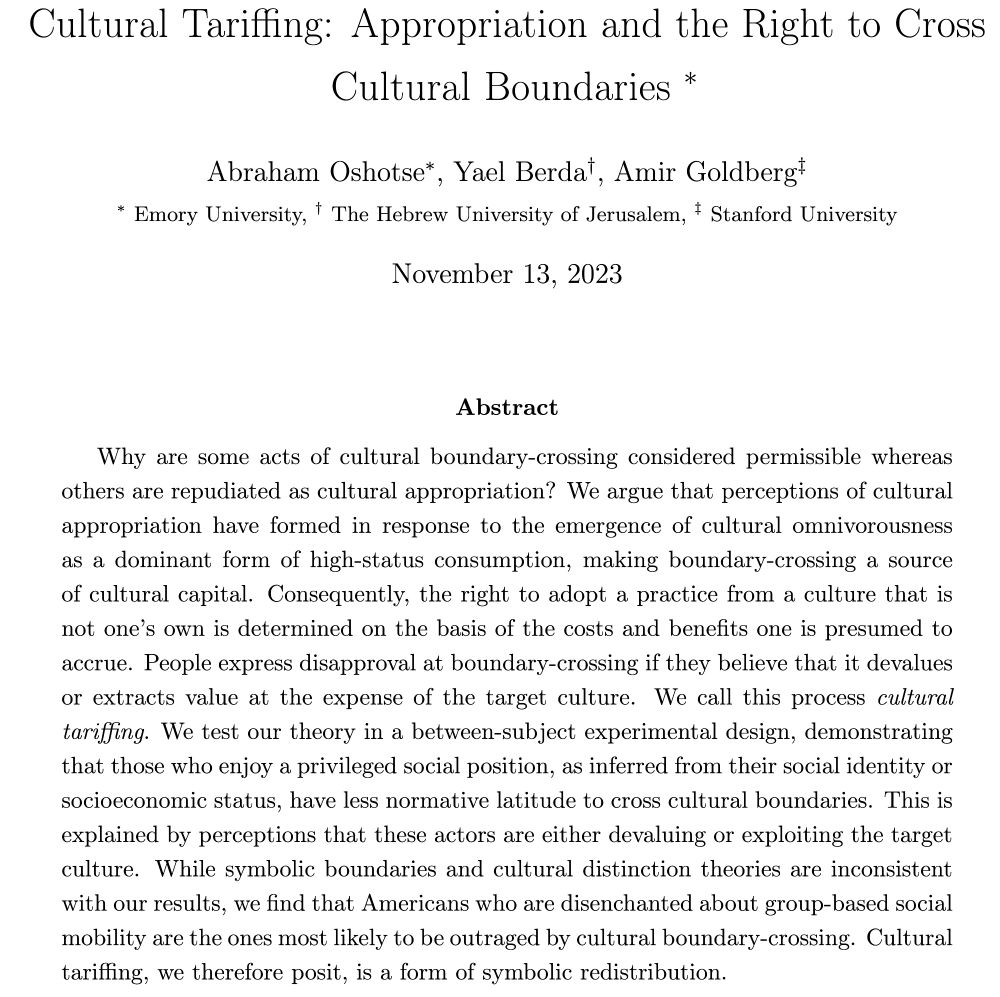
Why is Macklemore often criticized for cultural appropriation, but Eminem mostly gets a pass? In a new paper, forthcoming
at ASR, we argue, and demonstrate, that people are allowed to borrow from other cultures if they incurred a cost. We call that “cultural tariffing.”
osf.io/preprints/so...
16.11.2023 18:14 — 👍 18 🔁 4 💬 3 📌 0
Thank you. Given that I adopt technological trends past their peak, I worry if this means bad things for bluesky....
07.11.2023 03:24 — 👍 2 🔁 0 💬 0 📌 0
Is watching you.
Political sociology x Computational social sciences @CrestSociology | @Polytechnique | @CNRS
Cultural evolution - Cognitive Science - Cognitive Anthropology. Assistant Professor of Organizational Behavior at Stanford GSB. Formerly postdoc fellow at the Santa Fe Institute.
sociology phd candidate @duke | https://tkeskinturk.github.io/
👩🏫 Professor at Wharton
📖 Author of the WSJ Bestseller #HowToChange
🎧 Host of Charles Schwab’s #Choiceology podcast
📰 Author of the Milkman Delivers newsletter @ http://katymilkman.substack.com
🌎 Website: www.katymilkman.com
Sociologist and Social Data Scientist at University of Copenhagen. Duke University PhD. Intergroup relations & computational social science. He/him/his. https://fmerhout.github.io
🎓 Senior Lecturer at the Department of Sociology, U of Haifa.
Previously: Stanford, Hebrew U.
Studying algorithms & culture, AI ethics, AI Hype, data infrastructures, microbiomic futures & more.
🏡 https://www.dankotliar.com/
Professor, UW Biology / Santa Fe Institute
I study how information flows in biology, science, and society.
Book: *Calling Bullshit*, http://tinyurl.com/fdcuvd7b
LLM course: https://thebullshitmachines.com
Corvids: https://tinyurl.com/mr2n5ymk
he/him
Assistant Prof. in Org. Behavior @StanfordGSB | Computational Culture Lab http://comp-culture.org | Social Networks, Cognition, Cultural Evolution, AI
Associate Professor @ UBC
computational sociology
machine learning is feminist
You only have to look at the Medusa straight on to see her. And she’s not deadly. She’s beautiful and she’s laughing.
www.lauraknelson.com
Associate Professor in Management at UCL.
Networks and Organizational Design.
Mostly found reading.
Very occasionally on Youtube: www.youtube.com/@antoinevernet
Sociologist. Co-editor of Contexts. Author of Long Live Queer Nightlife (Princeton). www.aminghaziani.net
Asst. Professor of Communication, Journalism and (by courtesy) Sociology at Stony Brook University. Author of, "We Have Never Been Woke: The Cultural Contradictions of a New Elite" -- out now via Princeton University Press.
Sociological Science is a general interest, open access sociology journal committed to the highest standards of rigor and relevance. We aim to be the flagship journal for social scientists committed to advancing a general understanding of social processes.
I study the evolution of human culture with a focus on environmental behaviors and institutions and an eye toward helping these become more sustainable on a single, limited planet. https://timwaring.info/
Political scientist at Johns Hopkins, author of Uncivil Agreement and co-author of Radical American Partisanship
The official account for the Cultural Evolution Society. Our mission is to promote the study of cultural evolution in research and practice.
www.culturalevolutionsociety.org
Computational social scientist and associate professor in the School of Government & Public Policy at the University of Arizona. I research online influence and social norms. Website: www.yotamshmargad.com
Paradigmatically promiscuous scientist. Ankylosaur enthusiast. Modeler of cultural evolution and related topics. Anti-fascist. Professor at UC Merced and the Santa Fe Institute.
Web: https://smaldino.com/wp/
All things K-12 education policy. Professor @PrincetonSPIA & Sociology; Director, Education Research Section.












